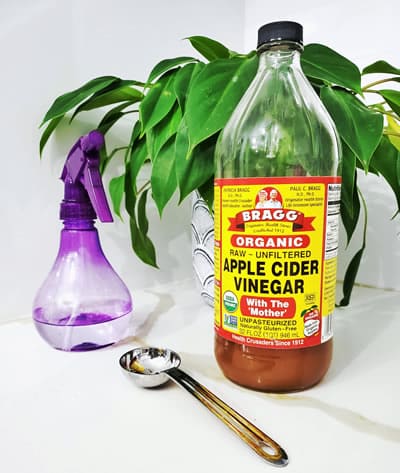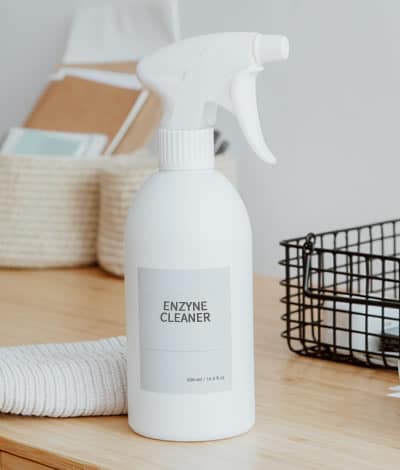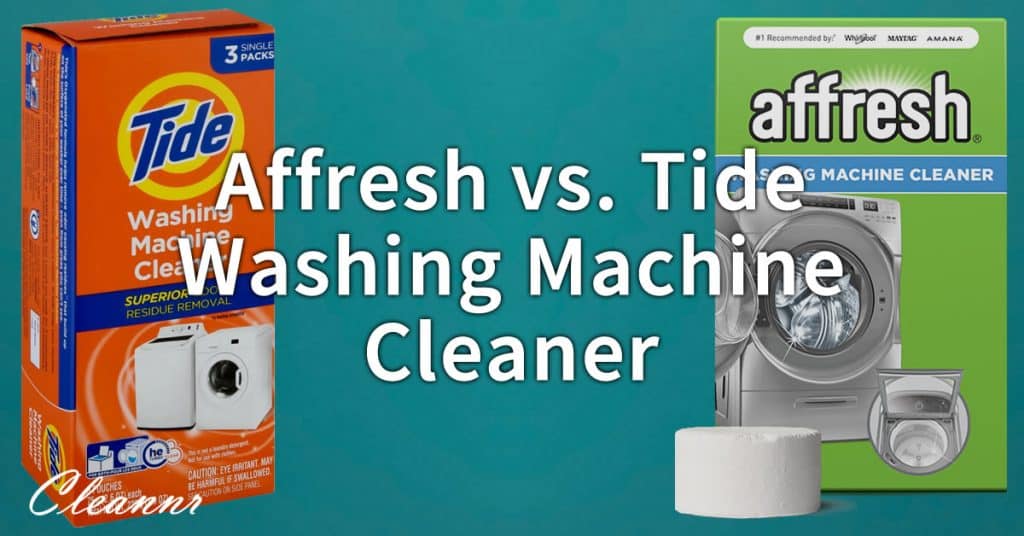Are you looking for a winning formula against stains in your kitchen? Then you’ve probably come across multiple DIY solutions, such as vinegar, baking soda, enzymes, or hydrogen peroxide. And there is a simple rule: the more you investigate, the more different answers and doubts you’ll have. So, who wins in the Vinegar vs Enzyme cleaner battle?
It’s not easy to answer all these questions and there isn’t a unique answer about Vinegar vs Enzyme cleaner, it’s everything about personal preferences and the type of stains you want to remove.
This article will help you to get a better understanding of DIY cleaners. You’ll be able to differentiate these two extremely useful cleaning agents and find the best option to clean stains from your kitchen or other rooms and places in your surroundings.
Contents
- Is vinegar an enzyme cleaner?
- What do you clean with vinegar?
- What do you clean with enzyme cleaner?
- How do vinegar cleaners work?
- How do enzyme cleaners work?
- How to clean with vinegar
- How to use enzymatic cleaner?
- Best vinegar to clean with
- Best enzyme cleaner
- What not to use vinegar on?
- What not to use enzyme cleaner on?
- Vinegar vs enzyme cleaner comparison table
- Final thoughts
Is vinegar an enzyme cleaner?
No, it’s not an enzyme cleaner, it doesn’t contain beneficial bacteria that breaks down molecules found in organic stains, like urine.
With this product, you’ll gain perfect results when cleaning and disinfecting your home, but if you have to handle greasy stains we’ll recommend you an enzyme-enriched cleaning agent.
What do you clean with vinegar?

Vinegar is one of the best multi-purpose home cleaners. Since the 1950s it developed a reputation as a “miracle cleaner” in almost every American household.
If you don’t know what do you clean with vinegar, here are some ideas for you:
- Greasy stovetop – Don’t waste your money on expensive chemicals. Just spray it and water mix on your stovetop and leave it for 10-20 minutes and scrub it down with hot water.
- Pots and pans – This cleaning product easily dissolves grease. All you need to do is to combine it with water and boil it for a couple of minutes and your pots will be like new.
- Kitchen sink – Make your sink shine again with just a few sprays of this cleaning agent and water mix. It cleans all watermarks and disinfects your sink.
- Dishwasher – Dishwasher collects a lot of bacteria, thus it often needs to be disinfected. Dishwasher tablets aren’t enough, so I recommend you to use vinegar. It’s simple: just pour a cup of it on the floor of the dishwasher and run the machine empty.
- Floor – Don’t buy expensive floor cleaners, use the vinegar and water mix instead and mop your floors. It will clean and disinfect all your surfaces.
What do you clean with enzyme cleaner?

Enzyme-enriched agents are powerful solutions against any organic stains. There aren’t strict rules, but these are some of the common uses of this product that will give you a clear picture of what do you clean with enzyme cleaner:
- Pet urine – If your pet gives you a lot of headache with urine, this cleaner will easily clean and disinfect the urinated place.
- Clothes – Enzyme cleaning agent removes all greasy stains. Just add one cup of it into the laundry machine and your clothes will be like new.
- Using steam cleaner – You can clean carpets of car interiors with an this cleaner, it’s effective against any organic dirt stains.
How do vinegar cleaners work?
Do you know how do vinegar cleaners work and what makes them such a good cleaner? The answer is: ACID. Vinegar is acidic and the acid easily removes different organic compounds, like grease, soap, or watermarks.
How do enzyme cleaners work?
Simplified, enzyme cleaning agents are a great combination of bacteria and enzymes that dissolve organic molecules. Scientists have combined “good” bacteria with enzymes that catalyze (speed up) the dissolving process. That combo is fatal for any grease or organic dirt stains.
How to clean with vinegar
If you’re wondering how to clean with vinegar, the answer depends on the purpose and the way you use it. Usually, it’s effective when you mix it with water up to a 1:1 ratio.
If you’re removing grease stains from your clothes, then you need to spray the vinegar/water mix. If you’re cleaning floors, just pour a cup of it in a bucket of water and it will be enough.
How to use enzymatic cleaner?
Similar to vinegar cleaner, the answer to the question How to use enzymatic cleaner depends on the purpose and object of cleaning. The easiest way is to mix it with water and spray it over the stain.
Best vinegar to clean with
It’s not easy to find the best vinegar to clean with and the more you ask, the more different questions you’ll get. Yet, my personal winner is Heinz All Natural Multi-Purpose Vinegar.
Heinz All Natural Multi-Purpose Vinegar
This multi-purpose product is available in almost every grocery store.
It’s the perfect formula of 6% acid vinegar and crystal clear water, tested to deliver the best result against dirt stains.
Best enzyme cleaner
These days on the market we can find numerous enzyme cleaning products. That can leave us confused and in trouble to choose the right one on the first try.
To save you money and time we’ll offer you our advice. We tested dozens of enzymatic cleaning solutions and concluded that Rocco & Roxie strength enzymatic cleaner offers the best results.
Rocco & Roxie strength enzymatic cleaner
Rocco & Roxie strength enzymatic cleaner has a professional-strength bio-enzymatic formula that releases active bacteria that feed on ammonia residue left behind in pet urine and other organic materials.
It will eliminate not only stains but odor as well.
Besides pet urine, this product will perfectly work on any organic materials like feces, vomit, and all that gross stuff.
You can use it on wood, tiles, mattresses, leather, concrete, carpets, and many other surfaces. That’s one more advantage of this product, you can use it anywhere!
What not to use vinegar on?
Even though it is a natural and non-toxic cleaning solution that can be a lifesaver in many situations, still there are a couple of things that shouldn’t be in contact with this product. Some surfaces can be seriously damaged when in contact with it so you should avoid its usage on:
- Granite and marble
Contact with those two natural stones can be a disaster. Vinegar can make granite and marble surfaces dull and cause loss of their natural shine. Besides, it can leave marks that are hard to remove.
- Ceramic tiles
Even though many ceramic tiles can be cleaned with this natural cleaner, some kinds shouldn’t be cleaned with it. Acidic liquid can eat into the grout and dissolve the finish on tiles.
- Wood
It can leave streaks and eat away at some finishes. Advice is to use specialized cleaning solutions for wooden surfaces.
- Washing machines and dishwashers
This product can harm rubber parts inside a washing machine or dishwasher. That can lead to leaks.
- Computer and cellphone screens
Layers of vinegar on the screen can strip off the protective coating, so it would be better for you to clean your screens with microfiber cloths.
- Knives
The acidic liquid can easily corrode the metal and dull knife edges. It’s better to clean your knives with warm water and soap.
- Iron
Many irons for clothes would not survive filling with vinegar to clean limestone in it. Manufacturers usually put their warnings in the manuals of those small appliances.
What not to use enzyme cleaner on?
There is no place where enzymatic cleaners cannot be used. However, the recommendation is to use it on molecules in organic materials like urine, feces, and food stains.
Besides, you can use it to unclog the drains, on laundry or carpets, and on any other place where enzymes can break the molecules down into smaller pieces and bacterias consume those molecules and leave your surfaces completely clean.
Vinegar vs enzyme cleaner comparison table
Below you can find the vinegar vs enzyme cleaner comparison table which might help you to decide which cleaner to choose.
| Vinegar cleaner | Enzyme cleaner |
|---|---|
| Cheaper than most cleaning products | More expensive |
| Natural product | Contains chemicals |
| Available in every grocery store | Available only in well-equipped stores |
| Bad smell | Pleasant smell |
| Doesn’t remove grease as chemical products | Effectively removes grease stains |
| Can damage wood surfaces and natural stones | Can’t damage natural stones and wood |
Final thoughts
I hope now you made up your mind about the vinegar vs enzyme cleaner topic. Both products have their benefits and their flaws and what will perfectly suit your needs depends on the specific situation. Some people avoid vinegar because of its smell, but on the other hand, this is a completely natural product and we can’t oversee the benefits of this characteristic.
Anyhow, in case you need additional information do not hesitate to contact us. Our team is at your disposal and will gladly help you. Happy cleaning!




